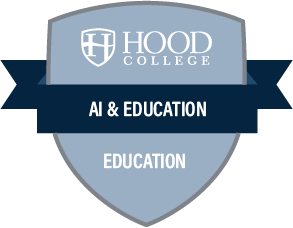Badge Overview
 AI and Education: Innovation, Impact, and Integrity
AI and Education: Innovation, Impact, and Integrity
Published Public {} Badge Class Data
AI and Education: Innovation, Impact, and Integrity

Issued by Hood College
Badge Description
The AI and Education: Innovation, Impact and Integrity badge offers educators and educational leaders a critical examination of artificial intelligence (AI) in K-12 and higher education. The course explores AI’s innovative potential to personalize learning and streamline administrative tasks, while also addressing its broader impact. Topics like bias, data privacy, misinformation and intellectual property concerns will be covered in this course. Learners will engage in emerging and existing technologies that support instruction, literacy, leadership and school operations. Through hands-on projects, discussions and readings, participants will develop the skills to make informed ethical decisions about technology integration. Legal aspects of digital tools, including copyright and digital citizenship, are also covered. Emphasizing integrity in educational practice, the course prepares learners to critically assess and lead the responsible use of AI in diverse learning environments. At the end of the semester, learners will be equipped to ensure unbiased and thoughtful applications of AI that support the core values of teaching and learning.
Artificial Intelligence
Educational technology
innovation
Ethical Decision Making
Leadership in Education
Critical Thinking
digital literacy
Badge Criteria
This FOUNDATIONAL level badge is equivalent to a 3-credit, master’s-level course. A final grade of B or better is required to earn this badge.
Aligned Outcomes
-
Internal
Core Competencies
https://www.hood.edu/offices-services/institutional-assessment/institutional-learning-outcomesGSO_CommCommunication
The badge earner will communicate clearly and effectively in oral, written and/or visual formats, consistent with the standards of their discipline.
-
Internal
Core Competencies
https://www.hood.edu/offices-services/institutional-assessment/institutional-learning-outcomesGSO_CriReasCritical Reasoning
The badge earner will approach content and tasks with a critical awareness, framed by knowledge and skills appropriate to their discipline.
-
Internal
Core Competencies
https://www.hood.edu/offices-services/institutional-assessment/institutional-learning-outcomesGSO_ProbSolvProblem Solving
The badge earner will apply advanced disciplinary content knowledge and strategies to understand and address problems and questions relevant to their discipline and to which they have not previously been introduced.
-
Internal
Core Competencies
https://www.hood.edu/offices-services/institutional-assessment/institutional-learning-outcomesGSO_DivDiversity
The badge earner will recognize and engage diverse ideas, perspectives and/or traditions that inform their discipline, profession and graduate experience.
-
Internal
Core Competencies
https://www.hood.edu/offices-services/institutional-assessment/institutional-learning-outcomesGSO_ProfProfessionalism
The badge earner will engage in legal, ethical and professional behaviors consistent with their discipline, including leadership, teamwork and/or other responsibilities to key stakeholders.
